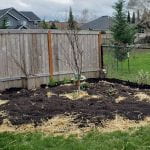#SOL22 #26
A short news article floated across my feed today, stating that “Oregon [where I live] has more than 120,000 miles of polluted or ‘impaired’ rivers and streams — the most nationwide.” This information is part of a recent report by the Environmental Integrity Project, which expressed dismay about our failures, “Long After Goal to Make All U.S. Waters ‘Fishable and Swimmable’ by 1983, 50% of Assessed River and Stream Miles Are Impaired by Pollution.”
In all honesty, I was surprised Oregon was so high on the list, because it is a state filled with people who love to spend time outdoors; hiking, biking, camping, paddle boarding… in other words, people who seem to appreciate and respect nature. As I dug deeper into the report, I discovered:
“Oregon has the most overall miles of rivers and streams categorized as impaired for any use (122,800 miles), followed by California (83,361 impaired miles), and Michigan (54,687 impaired miles). Changing water temperatures are responsible for impairing three quarters of Oregon’s river and stream miles, because many streams have become too warm to provide a healthy habitat for cold water fish or other aquatic life. Stream temperatures can increase when flow rates are reduced by the diversion of waters for irrigation or when agricultural and urban runoff reduce water depth by filling streambeds with sediment. Other causes include the removal of trees and vegetation that help to shade and cool streams. Reversing the loss of forest and vegetative buffers and protecting streams from runoff may become even more important if climate change, which brought such extreme heat to Oregon last summer, continues to drive hotter weather.”
 I found it fascinating that they did not blame the increasing water temperatures on the catchall “climate change,” but rather on our agricultural practices and disregard for nature in our urbanization practices. I am living in that reality, and a party to the problem. I moved into a brand new home two years ago which backs onto a protected wetland, which I’m excited about. But… did the developer really pay attention (or care) about making sure nature was respected in how they excavated, built, chopped down trees, etc. in the process. Absolutely not.
I found it fascinating that they did not blame the increasing water temperatures on the catchall “climate change,” but rather on our agricultural practices and disregard for nature in our urbanization practices. I am living in that reality, and a party to the problem. I moved into a brand new home two years ago which backs onto a protected wetland, which I’m excited about. But… did the developer really pay attention (or care) about making sure nature was respected in how they excavated, built, chopped down trees, etc. in the process. Absolutely not.
I’m pleased to be counterbalancing these destructive moves with my slowly evolving permaculture gardens in the back yard, but it is not enough. In all honesty, I don’t have any good answers to resolve this growing disconnect between what Mother Earth needs and what the humans who inhabit the planet think they “deserve.”
‘Mother Nature,’ needs voices like yours. Everywhere in the world people should be thinking about how we can preserve her. Your slice makes me think about the neglect of our environment where am. I have been addressing this for a while. Ours is about the discarding of plastic and how it is affecting the environment. Thanks for your voice and your hand in creating awareness with the slice and doing your bit with the “permaculture gardens.”
Ah, yes, plastics. I saw a headline today that microplastics have been detected in human bloodstreams for the first time. In Oregon, they banned the use of single-use bags at the grocery stores, etc. in 2019. Then Covid-19 happened, which I thought was the reason stores are still offering bags (although theoretically they charge 5 cents for each one. The rest of the story is the plastic industry lobbied for (and won) the implementation of reusable plastic bags in stores as a viable alternative. I am sure MANY (most?) people throw the reusable plastics away.
I’m doing my tiny bit, and as I tell my kids, I believe in the power of grassroots movements becoming, such as what I have witnessed with organic (and now regenerative) agriculture.